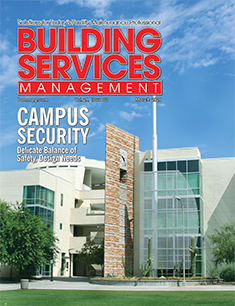March 2026
 |
Inside the March Issue |
Vinyl Floor Care Prevent Dirt Buildup via Regular, Scheduled Maintenance
 The first step to maintaining any floor
surface is to prevent dirt and debris
from entering the facility in the first
place.
The first step to maintaining any floor
surface is to prevent dirt and debris
from entering the facility in the first
place.
Prevention of the build up of contaminants
will not only keep your floor
cleaner, but it will considerably reduce
maintenance costs and improve indoor
air quality.
Milliken, a manufacturer of flooring
products, including Luxury Vinyl Tile, advises
against using excessive amounts of
water, cleaners, strippers or finishes. Do not
use metal or razor scrapers to remove dirt
or marks, either. This will likely damage the
protective wear layer. Consult cleaning
product manufacturers for guidelines when
cleaning.
Vinyl floors require regular sweeping,
vacuuming (no bristle beater bars), and
damp mopping with a neutral pH cleaner
to remove dirt and grime. For proper maintenance,
avoid harsh chemicals, wax, or abrasive pads, instead using white, light
green, or red pads for scrubbing. Promptly clean spills and use protective mats at
entryways to protect the finish.
Daily Routine Maintenance
Dry sweep or dust mop the floors on a
daily basis and then damp mop the floor
with a mild neutral cleaner, such as daily
cleaners with a pH of 7, or better yet, a
neutral peroxide cleaner.
Most peroxide cleaners are not only
safe for the environment, but can be used
on a variety of hard surfaces and carpet.
There are even peroxide cleaners that disinfect
while they clean. The last rule of
thumb for regular maintenance is to clean
spills as quickly as possible, not only to
protect the flooring, but also to reduce the
potential for slip and fall accidents. Full story »
Graffiti Removal
Know the Many Hazards Workers May Face
Besides chemicals, employees can
face other hazards when removing
graffiti. Here are a few.
Repetitive Stress Injuries (RSIs). When
you remove graffiti, you may spend a lot
of time standing, bending, reaching,
scrubbing, and repeating the same motions
over and over. These activities can
cause fatigue, pain, numbness, or tingling
in your hands, wrists, elbows, shoulders,
neck, back, feet, and legs. Full story »
today's news
ABM to Integrate Citizens Bank Park for MLB
PHILADELPHIA -- ABM, a provider of integrated facility services, has signed a new, multi-year partnership with the Philadelphia Phillies to deliver fully integrated engineering, maintenance and cleaning solutions at Citizens Bank Park.
Mr. Clean Out of Retirement With Big Ideas, Magic
CINCINNATI -- Mr. Clean is coming out of retirement, newly inspired, freshly energized, and ready to reveal the biggest innovation of his legendary career.
Civeo Enjoys Record Results in Australia
HOUSTON & CALGARY -- Civeo Corporation, a provider of hospitality services and facility management for the energy industry, is crediting its Australian segment for the lion’s share of fourth quarter revenues.
Ecolab Appoints Co-COOs for Global Business
ST. PAUL, MN -- To support its next phase of growth, Ecolab is dividing the chief operating officer role into two complementary positions to build high-performing global businesses while strengthening the foundations for growth around the world.
Leo Unites Providers Under One Platform
WEST CHESTER, PA -- Leo, a facilities maintenance service provider network backed by Orion Group, has launched its new strategy as a unified platform.
Windex Named to Clean LED Court at Big 12 Tourney
RACINE, WI -- Windex, a brand trusted by generations for its famous streak-free shine, has been named the Official Glass Cleaning Partner of the Phillips 66 Big 12 Basketball Tournaments.
Green Building Groups Form HVAC Change Lab
WASHINGTON -- Three nonprofits that support green buildings have formed the HVAC Change Lab, a partnership to improve health, safety, and academic success by upgrading heating, ventilation, and air conditioning (HVAC) systems in schools.













